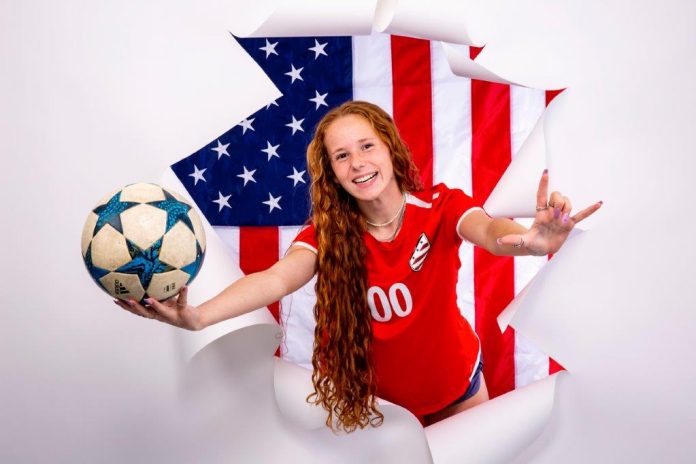Ella Sheridan isn’t unlike most teenage soccer players in that you can pick any day of the week, and she’s likely going to be on a field somewhere. The Argyle resident and junior at Westlake Academy has played competitive soccer since she was in the fifth grade and is used to a hectic travel schedule with her local select team.
But last month, Sheridan had the opportunity of a lifetime as she competed for a gold medal in Brazil — all because of the one thing that does make her just a little bit different than her teammates back home.
You see, Sheridan has been deaf her entire life and can only hear with help from a cochlear implant she got when she was a baby.
In May, Sheridan, 17, was one of 22 hard-of-hearing athletes who competed for the U.S. Deaf Women’s National Soccer Team at the 2022 Deaflympics in Caxias do Sul, Brazil. The team won all five games, including a thrilling 4-2 shootout win over Poland in the finals following a 1-1 draw in regulation.
This was the team’s fourth gold medal, and players who came from all over the world to compete used different methods of amplification and communication, including implants, hearing aids, and sign language.
To play, however, they must remove any hearing device before each game and rely more on sight, hand gestures, and flags.
Ella said the average age for athletes on this year’s roster was 25. That means she was competing alongside girls her own age as well as ladies in their 30s. It was a big change from Sheridan’s normal competitions and a different element to the game she loves. But she wouldn’t change a thing. In just her first appearance, Sheridan is already an advocate for deaf players all over the country.
“It’s something you really can’t describe. It’s so much more than just about yourself,” said Sheridan, who made the team as a backup goalkeeper after two tryouts last summer in Utah and Los Angeles. “When you’re on the field, you just focus on playing. But this is a culture. It was a great feeling to unite with and be on the same field with athletes who are just like me.”
She added, “Being with these teammates and seeing the range of hearing allowed me to find myself.”
Anyone who spends more than two minutes with Sheridan is often fooled by her impairment, mostly because she’s incredibly articulate and doesn’t let the fact that she’s deaf define her. She is the only deaf athlete on her local select team and rarely comes across other hard-of-hearing athletes while competing in tournaments all across the country. But the reality is that she had no access to sound through the first year of her life, and she still doesn’t hear sound quite like everyone else.
Her parents opted to have her undergo surgery as an infant to install a cochlear implant, a small device that electronically stimulates hearing. A cochlear implant is different from hearing aids in that it bypasses damaged portions of the ear to deliver sound signals to the auditory nerve. A sound processor fits behind the ear and captures sound before sending that signal to a receiver implanted under the skin behind the ear.
According to the National Institute on Deafness and other Communication Disorders, roughly 736,900 cochlear implants have been implanted worldwide. In the United States, roughly 118,100 devices have been implanted in adults and 65,000 in children. About two to three out of every 1,000 children in the U.S. are born with a detectable level of hearing loss in one or both ears.
“If she’d been born 40 years ago, she wouldn’t have near the opportunities she has now because of this device,” Ella’s mother, Louise Sheridan, said. “It can fool people because of the fact that her language is so good. But what they don’t realize is that she was in speech therapy for 10 years. A lot of legwork was done on the front end to help her.”
Ella agreed.
“It’s all I know, but I’ll never hear a natural sound — and sometimes, I struggle with that,” she said. “I would compare it to being a lot like an iPhone recording. There is sometimes a lot of background noise and wind that makes what I hear not as crystal clear. I get a lot of, ‘It’s not even like you are deaf.’ But there is a power struggle going on — you’re never quite hearing enough.”
None of that has stopped Ella from reaching new heights. Beyond the soccer field, she is an exemplary student at Westlake Academy and boasts a 103 GPA. She hadn’t heard of the U.S. Deaf Women’s National Soccer Team until she and her parents had a chance encounter at an out-of-town restaurant last year. She had just finished competing in a select game when another parent whose child is deaf and had been involved with the national team noticed Ella’s device. They struck up a conversation, and the Sheridans were immediately interested.
“They started communicating and eventually invited her to camp,” Louise Sheridan said. “The best part was that her select coach was very supportive and wanted Ella to have this experience. She was in Brazil for three weeks, and it was a wonderful opportunity to play soccer at a high level with other athletes like her. It was a wonderful bonding experience.”
The best part is that Ella will have another chance to make the team next year when it competes in South Korea.
“When you’re playing soccer normally, you compete against other really good select teams,” Ella said. “But the fact that you get to play against another country is so much different. It’s like, ‘Yeah, we’re playing Japan.’ It’s a great feeling.”







 GIF.gif)








